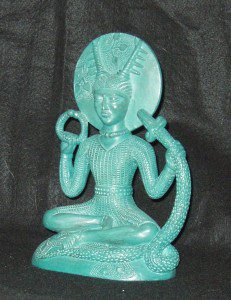Several commenters on my last post (both here and on social media) have pointed out that John Halstead’s original essay on the Three Centers of Paganism included the idea that the three centers overlap. That’s correct, of course, and I’m hardly unique in my quest to integrate Nature-centered, self-centered, and deity-centered beliefs and practices. But I feel a particularly strong need to consciously combine three separate identities into one whole identity.
Beyond my own concerns, it seems the loudest voices in the current Pagan kerfuffle are all speaking from one and only one center. If they are deity-centered, gods and goddesses (and perhaps ancestors, who are on their way to becoming deities) are their only concern. If they are self-centered, refining their souls is their only concern, and gods are metaphors or archetypes who support that refinement. If they are Nature-centered, then caring for the Earth and relating to the rest of the natural world is of primary importance.
To a certain extent this is understandable. Discoveries and advances – whether material, spiritual, or cultural – are usually made by specialists, not generalists. Our new Pagan religion(s) need these specialists creating and recreating ways to connect to the gods, techniques for spiritual growth, and ways of living sustainably.
The problem is that when you dive deeply into one small area, there is a tendency to view that area as the most important area… and in extreme cases, as the only important area. When your experience is very strong and aligns with lore and with the experiences of your coreligionists, there is a tendency to view those experiences as being literally and even exclusively true.
In other words, it’s easy to lose sight of mystery.
Last year, fellow Patheos blogger Aidan Kelly presented a series of posts on his recreation of the famous Eleusinian Mysteries (here’s a link to the first post – they aren’t all consecutive). It’s quite good and although it’s long, if you’re interested in what went on I highly recommend it. But even if by some brilliant combination of scholarship, gnosis, and luck Aidan was able to perfectly describe who did what, when, and where, reading his posts would not explain the mysteries to you. A mystery cannot be told, it can only be experienced, and experience is an individual, subjective thing.
If that is true at the level of mystery cults and initiations, it is doubly true at the level of the Divine.
 I have a long relationship with Cernunnos. I met him in the woods when I was a child. I didn’t know who he was, much less that he was a god. He reintroduced himself later and called me to be his priest. I’ve led rituals in his honor. I pray to him every night. On two occasions I’ve experienced him in direct communion. I am absolutely convinced he is a real individual being with his own unique personality and agency. But the strength of my conviction doesn’t make it so.
I have a long relationship with Cernunnos. I met him in the woods when I was a child. I didn’t know who he was, much less that he was a god. He reintroduced himself later and called me to be his priest. I’ve led rituals in his honor. I pray to him every night. On two occasions I’ve experienced him in direct communion. I am absolutely convinced he is a real individual being with his own unique personality and agency. But the strength of my conviction doesn’t make it so.
If someone else says Cernunnos is an aspect of a universal Horned God, on what grounds can I say they’re wrong? If someone else says he’s a metaphor for the masculine principle, on what grounds can I say they’re wrong? I can say “your theory doesn’t match my experience” or “your ideas aren’t helpful to me” but that doesn’t mean I’m right and they’re wrong.
For all any of us know or think we know about the gods, their true nature remains a mystery – something we cannot know, not because we don’t have the information or because our measurement technology isn’t sufficiently advanced, but because it’s beyond the capacity of humans to know. Acknowledging mystery is an act of humility and integrity. It accepts the limitations of human perception but refuses to be restricted to only one way of knowing.
Practice diligently enough and deeply enough and like mystics of every age and every religion, eventually you will find Mystery, those moments of timelessness where the illusion of separation fades away and we realize we’re all connected, that we’re all One.
Just so there’s no misunderstanding, that statement is not an expression of monotheism. This is pantheism, or perhaps monism, and is perfectly compatible with hard polytheism: the gods are part of the Great Mystery, the same as you and me and the rocks and trees.
Secondly, it does not mean all religions are equal. We may not be able to say with certainty that one religion is more true than another, but we can – and should – say that some are more helpful than others.
And this is not an excuse for vague, little-of-this-and-little-of-that religion. Great mystics become great mystics by delving deeply into their own traditions, not by shallowly hopping from one to another.
I like theology and its rational speculation on the nature of the gods. I’ve got a long essay where I elaborate on “What Are The Gods?” It was written for another purpose and I need to rework it into two or three blog posts. My theories give me a framework for my spiritual practice. But accepting mystery means I don’t have to pretend I know more than I do and I don’t have to argue with others over matters that cannot be objectively resolved.
I like knowing, but it’s OK to not know what can’t be known. Blessed be mystery. Blessed be Mystery.
















